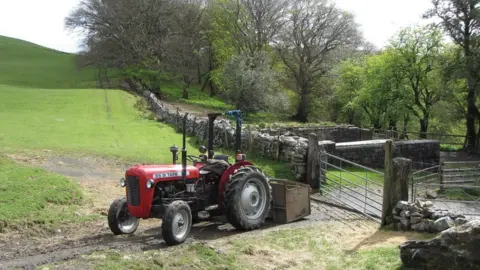Climate: Changes to Welsh government farming tree plans
 Gareth James/Geograph
Gareth James/GeographCould farmers in Wales become world leaders in sustainability?
That is the aim of the Welsh government, as it announces changes to its farming funding plans.
The controversial proposals will now see farmers have more time to comply with tree planting requirements of 10% of farmland.
But union leaders said the plans still presented a "barrier" to entering the scheme for many.
A requirement to plant 10% of farmland with trees has proved to be one of the most contentious aspects of the Sustainable Farming Scheme.
The latest proposal gives farms until 2030 to comply and stipulates the 10% figure only applies to land where conditions allow.
Farmers would be given a top-up payment for the first five years to allow them to work towards the new requirements without losing money.
Reducing the minimum amount of land which needs to be farmed to claim subsidies has also been proposed, which the government said made it more likely small-scale horticulturalists as well as traditional farmers would apply.
But details of payment rates will not be revealed until summer 2024, just months before the scheme begins.
The Sustainable Farming Scheme is set to take effect in 2025, replacing European Union payments that had been worth over £300m a year to Welsh farms.
The plans - one of the Welsh government's flagship proposals to fight climate change - were thrown into crisis in July, when NFU Cymru leaders announced they would not take part in the scheme as it was proposed, mainly due to the tree-planting requirement.
There will be three levels of funding farmers can apply for.
The first is payable to anyone who applies and has 17 requirements, including developing hedgerows for wildlife habitats and managing peatlands.
The next two levels cover farmers who want to go further in their nature work, but the new plans suggest delaying the introduction of that funding.

Alexander Phillips of the environmental body WWF Cymru said the delay risked farmers "going out of business or being forced to abandon existing nature-friendly regenerative practices".
"That's a potential gap of three or four years before we actually get that dedicated support for more advanced nature-friendly farmers," he said.
"We've had farmers contact us... in tears suggesting that they're going to lose a lot of money, that decades of investment and hard work is being ignored by government at the time when they are doing the very thing that Welsh government say they want to incentivise."
Gareth Parry, deputy head of policy at the Farmers' Union of Wales, said the Welsh government had "listened in certain areas" but the lack of payment details made it hard for farmers to take a view on the plans.
However, he urged members to make their voices heard.
"This is our final chance to influence the scheme which will in effect shape the future of agriculture here in Wales," he said.
NFU Cymru president Aled Jones said it was "difficult to see how the scheme will be able to deliver the same level of stability for farm businesses, the supply chain and our rural communities as the current arrangements do".
The plans will be open to consultation until March.
Lesley Griffiths, minister for rural affairs, said: "We have seen first-hand the impact of extreme weather patterns such as drought and floods on farming.
"These events will only increase in frequency and are the biggest threat to sustainable food production. That is why we must ensure future support for the industry addresses this issue."

- THE POWER OF WALES: How is Wales leading the way in sustainable power?
- DEATH OF A CODEBREAKER: The man found naked and dead inside a bag

